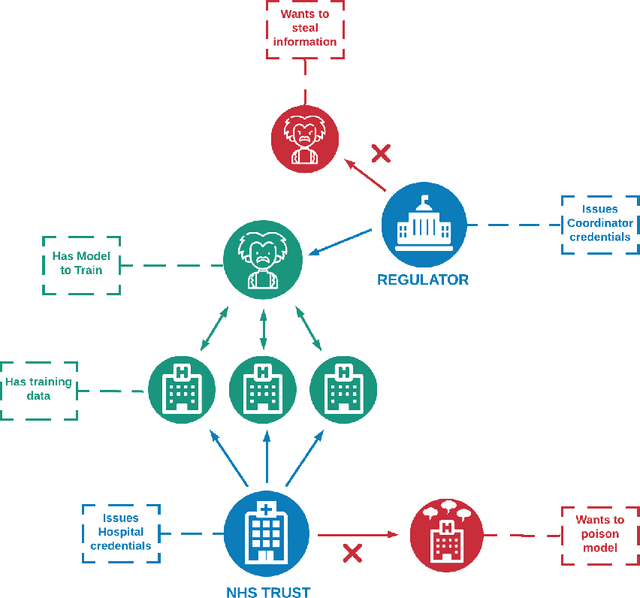Will Abramson
Privacy and Trust Redefined in Federated Machine Learning
Mar 30, 2021



Abstract:A common privacy issue in traditional machine learning is that data needs to be disclosed for the training procedures. In situations with highly sensitive data such as healthcare records, accessing this information is challenging and often prohibited. Luckily, privacy-preserving technologies have been developed to overcome this hurdle by distributing the computation of the training and ensuring the data privacy to their owners. The distribution of the computation to multiple participating entities introduces new privacy complications and risks. In this paper, we present a privacy-preserving decentralised workflow that facilitates trusted federated learning among participants. Our proof-of-concept defines a trust framework instantiated using decentralised identity technologies being developed under Hyperledger projects Aries/Indy/Ursa. Only entities in possession of Verifiable Credentials issued from the appropriate authorities are able to establish secure, authenticated communication channels authorised to participate in a federated learning workflow related to mental health data.
* MDPI Mach. Learn. Knowl. Extr. 2021, 3(2), 333-356; https://doi.org/10.3390/make3020017
A Distributed Trust Framework for Privacy-Preserving Machine Learning
Jun 03, 2020



Abstract:When training a machine learning model, it is standard procedure for the researcher to have full knowledge of both the data and model. However, this engenders a lack of trust between data owners and data scientists. Data owners are justifiably reluctant to relinquish control of private information to third parties. Privacy-preserving techniques distribute computation in order to ensure that data remains in the control of the owner while learning takes place. However, architectures distributed amongst multiple agents introduce an entirely new set of security and trust complications. These include data poisoning and model theft. This paper outlines a distributed infrastructure which is used to facilitate peer-to-peer trust between distributed agents; collaboratively performing a privacy-preserving workflow. Our outlined prototype sets industry gatekeepers and governance bodies as credential issuers. Before participating in the distributed learning workflow, malicious actors must first negotiate valid credentials. We detail a proof of concept using Hyperledger Aries, Decentralised Identifiers (DIDs) and Verifiable Credentials (VCs) to establish a distributed trust architecture during a privacy-preserving machine learning experiment. Specifically, we utilise secure and authenticated DID communication channels in order to facilitate a federated learning workflow related to mental health care data.
 Add to Chrome
Add to Chrome Add to Firefox
Add to Firefox Add to Edge
Add to Edge